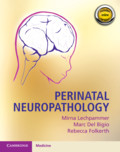Book contents
- Perinatal Neuropathology
- Perinatal Neuropathology
- Copyright page
- Contents
- Preface
- Acknowledgments
- Abbreviations
- Section I Techniques and Practical Considerations
- Approach to Autopsy of the Perinatal Nervous System
- Ancillary Studies
- Chapter 5 Microbiology
- Chapter 6 Cytogenetics and Molecular Diagnostics
- Chapter 7 Metabolic Studies
- Chapter 8 Toxicology
- Prosection Techniques
- Tissue Selection
- Reporting
- Section 2 Human Nervous System Development
- Section 3 Stillbirth
- Section 4 Disruptions / Hypoxic-Ischemic Injury
- Section 5 Malformations
- Section 6 Perinatal Neurooncology
- Section 7 Spinal and Neuromuscular Disorders
- Section 8 Eye Disorders
- Section 9 Infections: In Utero Infections
- Section 10 Metabolic / Toxic Disorders: Storage Diseases
- Section 11 Forensic Neuropathology
- Appendix 1 Technical Considerations in Perinatal CNS
- Index
- References
Chapter 6 - Cytogenetics and Molecular Diagnostics
from Ancillary Studies
Published online by Cambridge University Press: 07 August 2021
- Perinatal Neuropathology
- Perinatal Neuropathology
- Copyright page
- Contents
- Preface
- Acknowledgments
- Abbreviations
- Section I Techniques and Practical Considerations
- Approach to Autopsy of the Perinatal Nervous System
- Ancillary Studies
- Chapter 5 Microbiology
- Chapter 6 Cytogenetics and Molecular Diagnostics
- Chapter 7 Metabolic Studies
- Chapter 8 Toxicology
- Prosection Techniques
- Tissue Selection
- Reporting
- Section 2 Human Nervous System Development
- Section 3 Stillbirth
- Section 4 Disruptions / Hypoxic-Ischemic Injury
- Section 5 Malformations
- Section 6 Perinatal Neurooncology
- Section 7 Spinal and Neuromuscular Disorders
- Section 8 Eye Disorders
- Section 9 Infections: In Utero Infections
- Section 10 Metabolic / Toxic Disorders: Storage Diseases
- Section 11 Forensic Neuropathology
- Appendix 1 Technical Considerations in Perinatal CNS
- Index
- References
Summary
Cytogenetics, the study of the function, number, and structure of chromosomes, is one of the central components in understanding somatic and constitutional genetic disorders. Prenatal and/or postnatal chromosome analysis can provide important data regarding a growing fetus or serve as a diagnostic tool for congenital abnormalities, mental and physical disabilities, and recurrent miscarriages. Congenital anomalies are often the result of uneven or numerical structural abnormalities of chromosomes. The diagnostic capabilities in the field of genetic counseling have been improved through significant advances in cytogenetic technologies, specifically in the chromosomal analysis.
- Type
- Chapter
- Information
- Perinatal Neuropathology , pp. 25 - 30Publisher: Cambridge University PressPrint publication year: 2021



